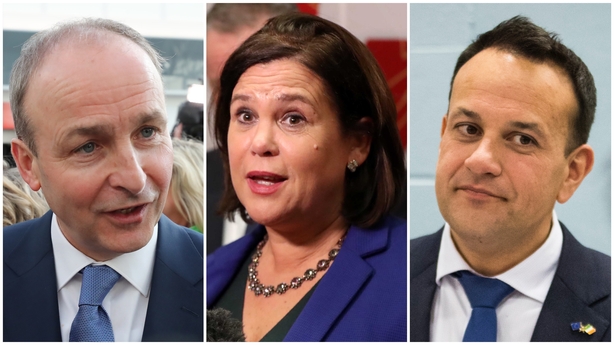The uncertainty caused by the election result at the weekend will have no immediate effect on the country's high grade sovereign credit rating, S&P Global said, but could lead to higher spending policies.
Sinn Féin almost doubled its vote share at the weekend from the last election to 24.5%.
Forming a new government could take weeks or months however.
S&P analysts said in a note that, "at this stage, the outcome of the February 8 election has no immediate effect on our (AA-/Stable) sovereign credit ratings", though they also stated a further election was possible.
"The unprecedented fragmentation of Ireland's popular vote may shift its policy settings, including toward a more relaxed budgetary stance, despite still-high public debt," they added.
S&P upgraded Ireland's rating in November, saying it expected general government debt to drop to about 50% of GDP by 2022 from roughly 60% and due to "vigorous" economic growth, which has been among the strongest in the world in recent years.
That took Dublin's rating back to the 'high-grade' double-A bracket for the first time since its euro zone debt crisis bailout in 2010 saw debt balloon to over 130% of GDP in gross terms.
This also saw S&P's peer Moody's cutting the country to 'junk', or non-investment grade as it is formally known.
The country's low unemployment and surging house prices underscore its current boom, though ratings firms highlight that headline GDP figures are flattered by Apple and other US tech firms booking intellectual property rights there, and by international aircraft leasing.

Fellow ratings agency Fitch agreed some fiscal loosening seemed likely after the election result and that while its projection for a continued fall in public debt levels accounted for significant increases in spending, it was subject to uncertainty on both the specific fiscal policy settings.
A reversal of the downward trend in government debt could be negative for the rating, although Ireland's resistence to external shocks is potentially rating positive.
S&P's note said any fiscal loosening under a new government coalition was likely be gradual and modest, and compliant with the European Union's Stability and Growth Pact, which is designed to limit overspending.
Ireland's borrowing costs showed little reaction yesterday to the election results with 10-year sovereign bond yields slipping 1.5 basis point on the day at -0.12%.
Analysts said the European Central Bank's asset purchase programme alongside Ireland's own robust growth backdrop were insulating it from the threat of political uncertainty.
"Beyond politics, fundamentals, supply and near-term Brexit certainty should all be a boost for Irish bonds," Natwest analysts said.
But the uncertain outcome has sent shares in Irish banks tumbling with AIB and Bank of Ireland all further extending yesterday's sharp losses today.
Traders are also concerned about how banking policy might be impacted if Sinn Féin is part of the next Government, including the possible end of the ability of banks to offset losses against tax bills and the potential for lenders to be forced to cut mortgage lending rates.
Property related stocks also took a big hit on the Dublin stock exchange yesterday in the wake of the election result, although some, including Hibernia REIT, IRES REIT and Cairn homes regained lost ground today.

